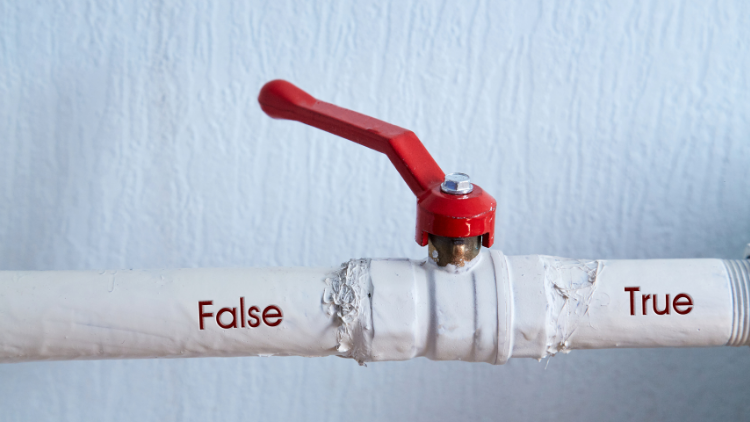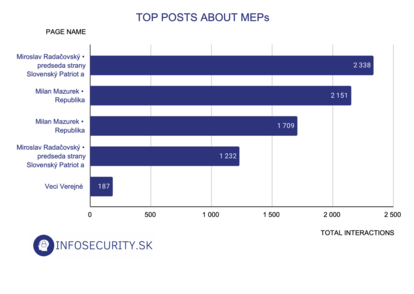DISINFORMATION
Slovak MEPs are branded 'traitors' as they fight to uphold the rule of law in the country, Pro-Russian actors accuse Latvia of oppressing the Russian minority

- Far-right politicians are utilising narratives criticising the European Parliament and accusing MEPs of betrayal, incompetence, and working against Slovakia's interests. This rhetoric aims to instil fear, create an image of an enemy, and position these politicians as defenders of Slovak sovereignty in the upcoming European elections.
- Slovak MEPs face accusations amid a rule of law struggle triggered by Prime Minister Robert Fico's controversial plans, with political actors attempting to shift blame from the government's actions.
- Disinformation actors endorse Putin's claims of Latvia oppressing its Russian minority, fueling tensions and justifying potentially aggressive actions while distorting the situation and linking it to the conflict in Ukraine
Far-right politicians are criticising the European Parliament with the aim of succeeding in the upcoming European elections
In recent weeks, narratives about the European Union, and more specifically about the European Parliament (EP), have been widespread in Slovakia. While at the beginning of December, disinformation actors, especially far-right figures, were spreading disinformation about the proposals being debated in the EP, now the most widespread narrative is that MEPs are traitors. These actors are also targeting the EP as an institution.
Milan Mazurek, vice-chairman of the far-right Republika party, wrote in a post on his official Facebook page: “MEPs have betrayed us! … If they have to vote in favour of Slovakia, they disappear! When they have to vote against nonsense, they vote against Slovakia! … We need MEPs who will fight for Slovakia!”
In another post, Mazurek criticises the EP as such and proceeds to call MEPs “patients” and “sick heads”. He also calls on the public to “stop these lunatics together!”. Additionally, in a post condemning one of the EP’s proposals, Milan Uhrík, chairman of Republika, said that the party is “working hard” in the EP to block discussed proposals and called the party “a voice of freedom and Slovak patriots in Brussels”.
Both of these politicians are very likely to run for the EP next year, and their rhetoric is presumably intended to prepare them for the next elections. They try to instil fear and create an image of the enemy, which they then pretend to fight against and vow to defend Slovaks from. Republika representatives are also trying to portray MEPs as incompetent and acting against the interests of Slovakia. They are doing this in an attempt to persuade people that they are the only ones equitable for the role, thus laying the ground for their upcoming election campaigns.
Slovak MEPs are under attack amid the rule of law struggle
A number of other actors also targeted Slovak MEPs. MEPs initiated a debate on the state of the rule of law in Slovakia after Prime Minister Robert Fico announced his plan to abolish the special prosecutor's office focusing on corruption (USP).
The main European bodies have said that any possible harm to the rule of law will be rigorously monitored in Brussels, as was the case with neighbours Poland and Hungary. Failure to meet the rule of law standards can lead to financial penalties in the EU, such as the freezing of EU funds, as Hungary experienced, for example. Therefore, some political actors accused Slovak MEPs of “working against” their country.
Miroslav Radačovský, who is also an MEP, focused his attention on Martin Hojsík – Slovak MEP from the Progressive Slovakia (“Progresívne Slovensko”) party who belongs to the Renew Europe faction and the vice-president of the EP. In a Facebook post, Radačovský claims that Hojsík “calls on the EU to punish his own homeland” and accuses him of “betraying” Slovakia. Hojsík, together with his faction, supported the initiation of the EP debate about the rule of law in the country.
In another post, Radačovský also criticised other Slovak MEPs who supported the initiative, such as Vladimír Bilčík, Ivan Štefanec or former EP vice-president Michal Šimečka. Radačovský claims that Slovakia “will suffer” as a result, but the mentioned MEPs do not care. “This grouping of individuals attacking their own state, their own citizens, as well as disrespectful and disparaging Slovak MEPs who think differently, literally sends a shiver of horror down the spine,” he adds. Radačovský also asserts that the only reason the MEPs are taking these steps is because their respective party did not win the state elections. His statements have been re-shared by alternative media such as eReport.
It must be said that Slovak MEPs are not the only ones who have reservations about the government's actions. The European Commission itself has issued a statement asking the Slovak Government not to advance with the changes until the reform has been thoroughly analysed and assessed.
What is more, with such rhetoric, the actors are trying to shift the blame to MEPs and present them to citizens as those who are trying to harm Slovakia in some way. In reality, however, this diverts attention away from the actions of the government, which is systematically taking steps which are indeed a threat to the rule of law in the country.
Furthermore, MEPs are not supposed to represent their respective member states. When elected, they represent the interests of the EU as a whole. At the same time, the above-mentioned actors are deliberately turning this rhetoric around for two reasons in particular. Firstly, they are attempting to raise their profile and gain preferences ahead of the forthcoming elections. Secondly, they are diverting attention away from the planned crude interventions in democracy and the rule of law by Robert Fico, with whom they share similar views on a number of critical issues. Most of the time, diversion of attention takes place through using narratives based on a fabricated conflict between national sovereignty and integration in structures such as the EU. The paradox, then, is that these actors are running for the office on the basis of identical rhetoric.
Since posts about MEPs and the European Parliament have been prevalent in the Slovak information space in the past two weeks, we also looked at the topic through the lens of a list of disinformation actors in Slovakia. We used the CrowdTangle analysis tool to analyse the most popular posts on Slovak Facebook, including the keywords “MEPs” (“europoslanci”) and “European parliament” (“Európsky parlament”). Posts were evaluated based on the total number of interactions (the sum of all reactions, comments, and shares).

The first place belongs to the aforementioned post made by an MEP, Miroslav Radačovský, in which he accuses Martin Hojsík of “betraying” his country.
The second and third places belong to already-mentioned posts made by Milan Mazurek, a vice-chairman of the Republika party. In the first one, he claims that Slovak MEPs are national traitors, and in the second one, Mazurek calls the MEPs “madmen” and “sick heads”.
The fourth place belongs to the aforementioned post by Radačovský, which consists of him accusing the Slovak MEPs of “attacking their own state and their own citizens”.
The last place belongs to the post published by a disinformation site Veci Verejné (“Public Affairs”), in which the page insinuates that the Slovak MEPs should be “ashamed” of themselves and called the steps taken by Martin Hojsík a “manifestation of liberal fascism”.
These are mostly actors who, more often than not, ignore democratic principles and, based on Hojsik's statements, which fundamentally called for international protection of democracy, they not only try to discredit similar efforts, but also create the initial lines of the election campaign. At the same time, this point is already indicative of the nature of the incoming campaign through the division of society and the use of labels which can be considered serious accusations and should not belong in political discourse.
Disinformers accuse Latvia of oppressing the Russian minority, and they endorse Putin's statements
One of the topics addressed by disinformation actors, although no longer political representatives, was the alleged oppression of the Russian minority in Latvia by the Latvian government.
In response to Russia's invasion of Ukraine in 2022, the Latvian parliament passed an amendment increasing residency requirements for Russian citizens. Consequently, Russians in Latvia have to apply for permanent residency and pass a basic Latvian language test. In October, Latvian officials informed nearly 3,000 Russian citizens that they would be forced to leave the country because they had failed to register for residency and the language test. The Baltic country, which was ruled by the Soviet Union for much of the twentieth century, has recently stepped up its efforts to minimise Russian influence in the public sphere.
In response, Russian President Vladimir Putin proceeded to threaten the Latvian government, citing the mistreatment of the Russian minority by the state. "If they pursue such a policy towards people who wanted to live in that country, worked there, created some good for that country, and they treat them in such a pig-like manner, then they themselves will face the same pig-like behaviour within their country," he stated. Slovak disinformation sites, which are generally known for spreading pro-Russian sentiment, further promoted his claims. The majority of them link the situation to Ukraine.
Bádateľ, a website notorious for spreading dangerous conspiracy theories, stated the following: "Latvia is beginning to oppress the Russian minority. They did not learn from what happened when Ukraine started to do this. They probably want to end up like it." This statement not only accuses Latvia and Ukraine of oppressing the Russian minority in the countries, which is unsubstantiated but also insinuates that some form of "retaliation" would be justified.
Another disinformation page, Slobodný vysielač ("Free broadcaster"), shared Putin's claims and asserted that "those who, in Putin's words, treat part of their population like pigs should not be surprised when it turns against them". The page has also commented on the new Latvian laws in the past by saying that "when some 'expert' explains to you again that the cutting of the rights of the Russian minority in Europe is just a HOAX, feel free to show them this article".
At a time when Putin is increasing tensions between Russia and NATO countries and hinting at a potential clash, such rhetoric can be seen as highly dangerous. Not only does it provide Russia with an alibi for taking aggressive action, but it also promotes the false narrative about the oppression of the Russian minority in Ukraine, which was used as a direct justification for the unprovoked Russian invasion. Additionally, registering for a residency and taking a language test can hardly be seen as treating a part of a population in a "pig-like manner", and presenting it as such gives Russia the necessary backing in the aggressive steps the country is taking in its policy.
Project Infosecurity.sk organized by Adapt Institute, which is supported by the Prague office of the Friedrich Naumann Foundation for Freedom, continuously monitors the activities of both Slovak and foreign disinformation actors, but focuses mainly on the former. The project activities are built upon daily monitoring of emerging disinformation, hoaxes, and conspiracy theories in the online information space. This approach allows the analysts to identify disinformation posts and narratives that resonated with the public the most, as well as to find out where they originated, and how they spread and evolved on social media. The report takes the form of a bi-weekly summary of arising trends in the spread of malicious information content online. Based on that, Infosecurity.sk can warn the public about emerging and current trends in the field of disinformation, manipulation, and propaganda.

